[Via Donna Passmore]
Dec. 9, 2008
DELTA – The Agricultural Land Commission’s decision to reluctantly hand over prime Delta farmland to Campbell government bulldozers reveals the extent to which the integrity of the farmland protection process has been destroyed, say New Democrat MLAs Charlie Wyse and Guy Gentner.
The commission has reluctantly agreed to remove 90 hectares from the Agricultural Land Reserve so the Campbell government can proceed with its preferred route for the South Fraser Perimeter Road, despite widespread public opposition. The commission said it “deeply regrets that suitable highway alignment alternatives to the use of prime agricultural land were found not to be acceptable from transportation and environment perspectives.”
The news follows last week’s discovery that construction along two sections of the proposed route started before any decision had been finalized.
Continue reading New Democrats slam Campbell’s plan to bulldoze prime Delta farmland »
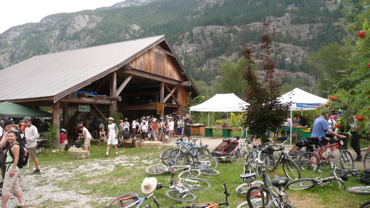
Yesterday I attended my first Slow Food Cycle Sunday, in Pemberton. Whew, what a ride!
We arrived in Pemberton Village rather on time considering the road construction on the Sea to Sky Highway. (No rockslides, thankfully!) Treacherous road, but man, what a view! The parking lot at Signal Hill Elementary School was rapidly filling up when we unloaded our stuff, packed up our saddle bags and took off in the direction of the Community Centre which would be our official starting point. It was obvious then that there was a huge turnout, and in fact the count thus far exceeds 2000 riders! It was mildly sunny and cool, but the weather didn’t do what was forecasted. It did the exact opposite, without the potential thunderstorm that seemed imminent.
Continue reading Slow Food Cycle Sunday Recap! »
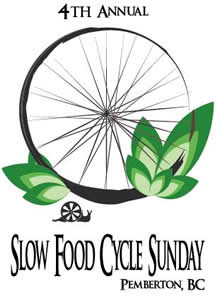
I learned of this annual event when I naughtily “borrowed” my landlady’s Westworld Magazine to read a few interesting food-related articles before I delivered it upstairs. When I finished reading the article about Slow Food Cycle Sunday, I wrote down the event details and without hesitation decided I would attend. (Do read the article, a PDF complete with tantalizing photographs!) Now the date is finally approaching — not that I wish summer to pass quickly as it has been, but I’ve been looking forward to this — and I’m training daily now for the tour.
Training?
Continue reading Slow Food Cycle this Sunday in Pemberton »
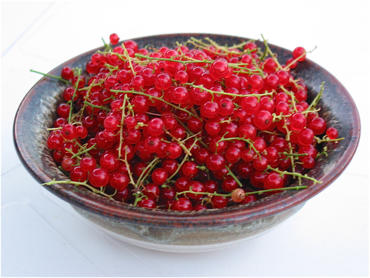
My family — mainly my oldest niece and I — have been enjoying the edible gifts borne by our favourite local park and other nearby forests. This summer’s crop has been especially fruitful and we’re expecting a ridiculous bumper crop of blackberries soon(!!!). I go crazy for salmonberries and introduced the avid 7-year-old berry-picker to the fine art of picking: get a grabby stick, dress the part, and get into the shrubbery! The two of us went on a little adventure, avoiding mud and trampling on dry brush, then hiking up the hill to safe ground when turning back to return across a log and over a creekbed seemed like a more difficult option.
If we’d had more time and more adults we could have probably matched the huge amount my friend and I picked last year. We missed out on picking at Green Timbers this year and I can only imagine how many berries must have been there. At any rate, over a few trips to the local parks here we yielded a significant amount for desserts and snacks, which the family enjoyed. Early in the season my cousin and his Korean girlfriend were here. She hadn’t tasted salmonberries before and the two of us went nuts!
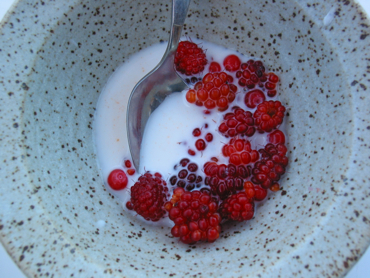
Continue reading Bunches and bunches of berries »
Celsias posted a shocking film, Patent for a Pig: The Big Business of Genetics (43 mins) with some grim truths about Monsanto that are beyond frightening. I find it hard enough to comprehend sometimes that we place a monetary value on something nature alone created, e.g. selling your cat’s litter or some plants that appeared in your backyard. (Breeding/raising is a bit different as there is work input into the result, but it’s still animals creating animals.) I’ll let the film tell the details, with this intro from the Celsias post:
It’s amazing what humankind can do with a little effort and ingenuity. Who’d a thought we could create an intelligent, four legged creature with a curly tail, that actually walks and makes cute grunting noises?
Stand by to be horrified at the lengths Big Biotech will go to take over the world’s food supplies. You’ll also be shocked to learn that pig and cattle farmers are seeing their livestock go sterile due to giving them genetically modified feed.
“Introducing Monsanto, the inventors of the pig…”
Thanks to my mother for the heads up on this item.

It figures it’s been a month and a half since I wrote Part 1 and said it would be “a couple weeks.” I have a legitimate excuse, however: the topic on which I desperately wanted to write was (is!) getting bigger and bigger as news stories and blog posts flooded the papers and internet on the topic. An overwhelming amount of information to sort through, half of it’s out of date by now and much of it I haven’t yet read.
My blogging has been sparse at best lately, and this behemoth of a topic isn’t helping. Of course I’d also like to write about everything! But whilst I muster up the energy/time to do this, here are my key points:
– global food crisis overview
– modern agriculture… permaculture… what our monoculture system + pesticide/herbicide use did to our natural systems: reducing yield, damaging and polluting the earth, losing diversity, bringing in GMO which is proven to harm humans
– hoarding: it’s human nature
– food wastage (also see BBC article)
– oil: peak oil, pesticides, the benefits of local eating
– community and personal gardening
– developers get (potentially large) tax credit by turning land into “public land” while waiting for a project to get underway, then can install a community garden, makes them look socially responsible
PHEW!
Well, now that I’ve got a few hours of my life per week back from the brain-sucking, life-wasting machine called the Television (I watch mostly intelligent programming, but it’s TV nonetheless), I should have few excuses not to sit down and churn this out. Unless, of course, I get distracted by Stephen Rees’s blog.
And now it’s time for bed, but I will leave you with this tidbit and links, and inform you that I’m still alive!
The Monday lunch blog addresses food… again!
A paradox, you say? How can a restricted diet be at the same time diverse? I reckon I might have asked myself the same question almost a year ago when I embarked on the very thing.
I have what you might call a self-imposed restriction on my diet in two ways: one, I have a tidy list of food sensitivities that were determined last March/April by a naturopath; and two, I’m on the 100-Mile Diet as far as veggies go — and you’d be surprised at how much of a challenge just that creates.
My food sensitivities are: soy, sugar, dairy (the proteins, not lactose), cashews, and some food additives. Corn was on the list for about 3 months so I just take it easy with that one. Yeast was also on the list, but when told to cut out all grains and refined foods including oats and quinoa for 2 weeks, I did what I normally do when trying to cut back: I ate more. And it went away, so whatever.
The personalised 100-Mile Diet I adhere fervently to is such that I don’t eat what ain’t in season. In other words, if it grows here in the summer, I don’t buy it from California in the winter. I haven’t applied this so much to dining out, but I can say that if I were strict, I’d have gone hungry at the Northern Voice conference because between the cheese, the unknown, spiced meat and the dismal tomatoes and iceberg lettuce curiously provided at lunch in the form of very unseasonal burritos, there wouldn’t have been much for me to eat. Suffice to say I had an apple with me and had forgotten my packed lunch at home.
But I digress.
Continue reading A diverse restricted diet »
Posted today to CBC.ca: “Michigan restaurateur makes 61-kilogram burger and hopes for world record”
The “Absolutely Ridiculous Burger,” made with beef, bacon and cheese, was delivered on a 23-kilogram bun, The Detroit News and the Detroit Free Press reported. It sells for $350, and orders require 24 hours’ notice.
How much water, corn/other feed, cow’s meat, cow’s milk, gasoline, energy and waste products went into making that? How much of it was meat? Moreover, how many third world people would it feed? How many of them would be shocked that humans consume crap like that?
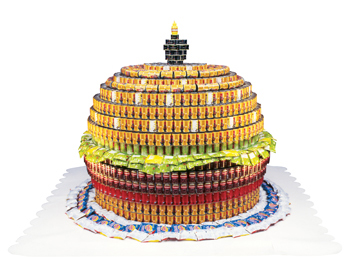
“Where’s the Beef?” Signals Design Group / Coast Paper at Canstruction 2005.
Meanwhile, in our corner of the continent, Canstruction® Vancouver starts showing tomorrow. I wonder if we beat any records for numbers of cans this year? All cans/food packages go toward nourishing the people who rely on the Greater Vancouver Food Bank. There, they appreciate the value of food!
What better to write about over a Monday lunch than food?
I never got around to posting about it, but I’ve been on a “restricted” diet for almost a year now (what an accomplishment) that requires me to find alternatives to cow’s milk and cheese, sugar/honey, soy sauce, cashews and products that contain any of the above (and any form of soy), plus some food additives like red dye. For awhile, corn was on the list, too and I’m just bringing it back into my diet now. The repercussions of this are not just psychological, physical, and emotional, they are also financial. But wait… are they?
Continue reading Is expensive food actually so in the end? »
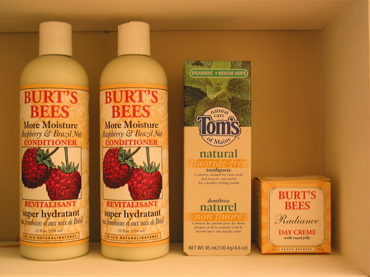
Who knew saving the planet could be so self-serving.
I’ve been thinking lately about how good I feel when I’m using or eating something that’s healthy for me and/or the planet. Now, “good” is a very broad term, but in this context it encompasses feelings of excitement, reward, self-satisfaction, accomplishment and wellness. (In other words, opposite of the dental pain and regret I’m feeling after having eaten a naughty piece of Toblerone. Glad it was the last one.)
I think it’s important to emphasize the personal benefits of doing good for the earth, and oneself. There are, in fact, many opportunities and I’m always looking for more.
I feel good when…
Continue reading Green at heart: feeling good starts with doing good »







